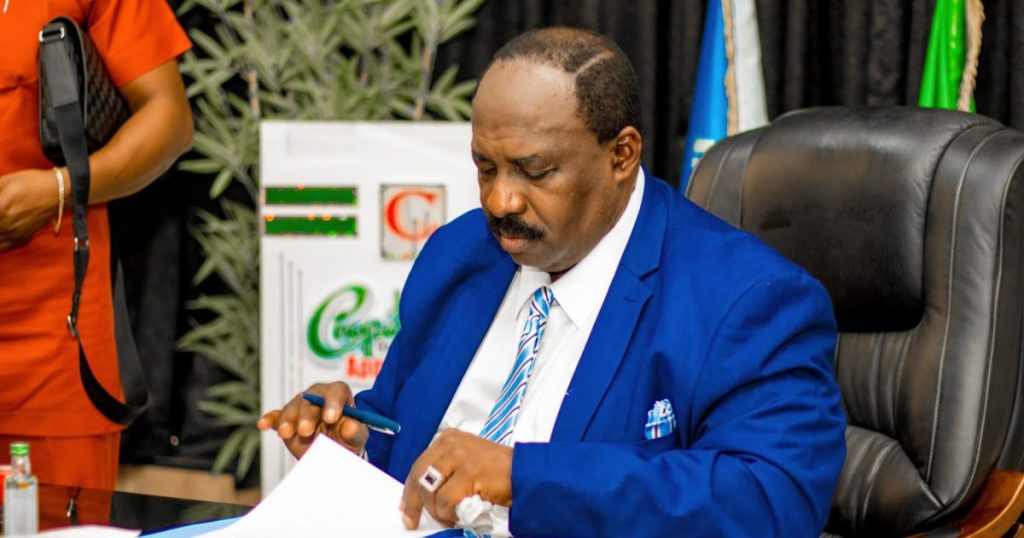The Nigerian Civil Aviation Authority (NCAA) has formally requested the Economic and Financial Crimes Commission (EFCC) to strengthen its fight against financial crimes within the aviation sector. This appeal, made during a courtesy visit by the NCAA Director General, Captain Chris Najomo, and his management team to the EFCC Chairman, Mr. Ola Olukoyede, underscores the growing concerns over fraudulent practices that threaten the safety and transparency of Nigeria’s aviation industry. Najomo highlighted specific areas riddled with vulnerabilities, including high-value transactions like aircraft acquisitions, leasing agreements, maintenance contracts with foreign entities, and the procurement of essential safety infrastructure. These areas, according to the NCAA, are prime targets for financial misconduct, potentially jeopardizing the safety and operational integrity of the aviation sector.
Captain Najomo emphasized the detrimental impact of financial improprieties on the NCAA’s ability to effectively oversee and regulate the industry. The non-remittance of statutory fees and levies, he argued, directly weakens the NCAA’s financial capacity to fund critical safety oversight activities and maintain operational efficiency. This financial constraint hampers the authority’s ability to ensure compliance with safety regulations, potentially endangering lives and undermining the overall credibility of the aviation sector. He called upon the EFCC to investigate suspected cases of deliberate withholding, diversion, or misappropriation of funds meant for the NCAA. The collaboration, he believes, is crucial to holding perpetrators accountable and deterring further financial malfeasance.
Beyond the issue of non-remittance, the NCAA Director General also brought to light the manipulative practices employed by some airline operators to circumvent financial regulations. He pointed to the under-reporting of revenues, manipulation of ticketing systems, and diversion of funds as prevalent tactics used to undermine the NCAA’s regulatory efforts. These practices, he argued, cripple the authority’s capacity to effectively monitor and regulate financial activities within the industry, creating an environment conducive to further illicit activities. He also flagged the issue of illegal charter operations masquerading as private flights, which often involve unregulated financial flows, further highlighting the complexities of the financial crimes within the sector. He urged the EFCC to leverage its financial intelligence capabilities to unravel these intricate schemes and bring the culprits to justice.
To combat these challenges, Captain Najomo proposed a series of collaborative initiatives between the NCAA and the EFCC. He suggested training NCAA personnel to identify financial red flags, indicating potential fraudulent activities. This training, he believes, would enhance the NCAA’s internal capacity to detect and prevent financial misconduct. He further proposed organizing sensitization workshops for stakeholders within the aviation industry to raise awareness about the implications of financial crimes and promote a culture of compliance. Finally, he advocated for enhanced intelligence sharing between the two agencies, enabling more effective investigations and a coordinated approach to combating financial crimes within the sector.
The EFCC Chairman, Mr. Ola Olukoyede, welcomed the proposed partnership, expressing his commitment to supporting the NCAA’s efforts to sanitize the aviation industry. He indicated that senior EFCC officers would collaborate with the NCAA to develop a formal Memorandum of Understanding (MoU) outlining the framework for joint investigations, intelligence exchange, and compliance monitoring. This MoU would formalize the collaborative relationship between the two agencies and provide a structured approach to tackling financial crimes within the aviation sector. Olukoyede acknowledged the prevalence of money laundering within the aviation industry, particularly through chartered services, further emphasizing the need for a strong collaborative approach.
The meeting between the NCAA and EFCC signifies a critical step towards strengthening the fight against financial crimes within Nigeria’s aviation sector. The collaborative initiatives proposed, coupled with the commitment from both agencies to enhance cooperation, offer a promising path towards greater transparency, accountability, and safety within the industry. The formalization of the partnership through an MoU will further solidify the commitment and provide a structured framework for effectively combating the complex financial crimes that threaten the integrity of the aviation sector. The collaboration, both agencies believe, will send a strong message to potential perpetrators and enhance public trust in the Nigerian aviation industry.


